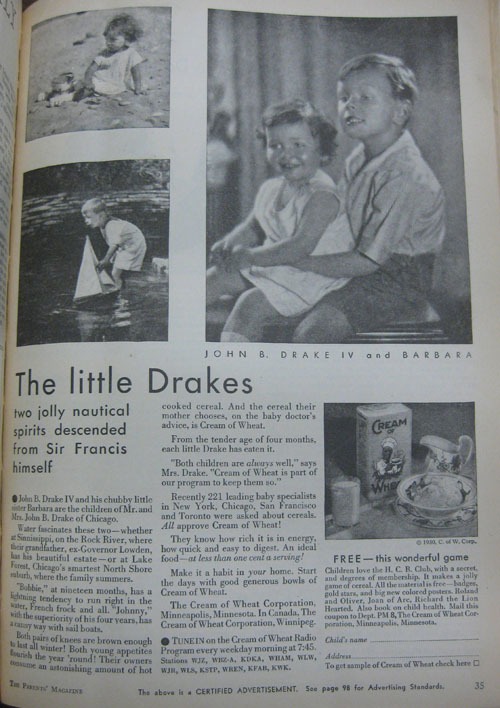Looking through issues of Parents’ Magazine from 1930, I found an interesting series of Cream of Wheat ads, starring children descended from famous families.
Roland Marchand wrote in his Advertising the American Dream about the advertising trope that he called the “Parable of the Skinny Kid”: 1930s ads for foodstuffs often featured an undernourished child, who failed at school because his parents didn’t feed him a good enough breakfast. Marchand argued that these ads mingled Depression-era anxieties about money and food with the new-as-of-the-teens-and-twenties emphasis on “scientific” child guidance. These Cream of Wheat poster children, from so early in the 1930s, epitomize abundance of well-being, rather than lack: “Both children are always well,” Mrs. Drake says of her “brown-kneed” offspring, descended from Sir Francis himself. “Cream of Wheat is part of our program to keep them so.”
Here, the pedigreed Six have “luck” not only because of their “names,” but because of the good sense their parents show in asking a “distinguished child specialist” what they should eat. This construction naturalizes the idea that rich people (especially rich mothers?) have access to expertise, and heed its counsel when possible; poorer people reading the advertisement can benefit from this second-hand knowledge.
According to this web page, Mary Pinchot, daughter of a wealthy lawyer who helped fund the radical magazine The Masses and a journalist who wrote for The Nation and The New Republic, grew up to have quite a crazy life. Did she have an affair with JFK, and did she do LSD with him, and was she killed by a hitman who thought she knew too much? I’m not sure if this is a conspiracy theory or not, but it does make for good reading. John Aspinwall Roosevelt, on the other hand, was the only FDR son who never ran for political office (says Wikipedia); he also converted to Republicanism later on in life, thereby proving that you can feed your son Cream-o-Wheat, but you can’t control how he uses that lifelong health you gave him.
More tanned legs in this one, in which Alfred Olivier Hero, Jr, makes a playground out of an old plantation. Viewed through the attentive eyes of a child, this fraught landscape is rendered innocent; even “old slave quarters” are a jungle gym and a photo op. (The precocious Hero became a political scientist and studied the US-Quebec relationship; he died in 2006.)
There are a lot of people worrying about the un-free nature of modern childhood these days; this ad shows that parents in 1930 received messages that they should exercise “careful surveillance” over their offspring at all times, while making sure that the kids don’t know that they’re watching. What careful labor must have been required to pull off this balancing act? And who was responsible for this labor? Mothers! (All grown up, sister Cynthia starred in a Ponds Make-up Remover ad in 1946; I wonder how many socialites had similar lifelong careers in advertising during this period.)




